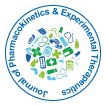开放获取期刊获得更多读者和引用
700 种期刊 和 15,000,000 名读者 每份期刊 获得 25,000 多名读者
抽象的
Pharmacokinetics of Antibodies: Understanding the Dynamics of Therapeutic Antibodies in the Body
Kim Zang
Antibodies have become essential tools in the field of biomedicine, with an increasing number of therapeutic antibodies being developed for the treatment of various diseases. Understanding the pharmacokinetics of these antibodies is crucial for optimizing their therapeutic efficacy and minimizing potential adverse effects. This review aims to provide a comprehensive overview of the pharmacokinetics of antibodies, including their absorption,distribution, metabolism, and excretion (ADME) profiles. The absorption of antibodies following different routes of administration, such as intravenous, subcutaneous, and intramuscular, is discussed, highlighting factors that influence their bioavailability and onset of action. The distribution of antibodies within the body, including their tissue penetration and interaction with target antigens, is examined to elucidate their potential therapeutic targets and limitations. The metabolism and elimination pathways of antibodies, involving processes such as proteolysis and clearance, are explored, emphasizing the role of the immune system and the impact of disease states on antibody pharmacokinetics. Factors affecting antibody half-life and dosing regimens, such as antibody size, target antigen expression, and the presence of neutralizing antibodies, are also examined.

 English
English  Spanish
Spanish  Russian
Russian  German
German  French
French  Japanese
Japanese  Portuguese
Portuguese  Hindi
Hindi